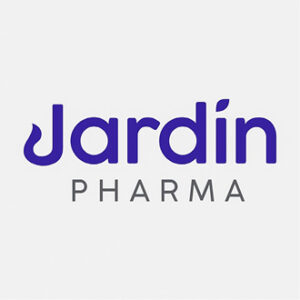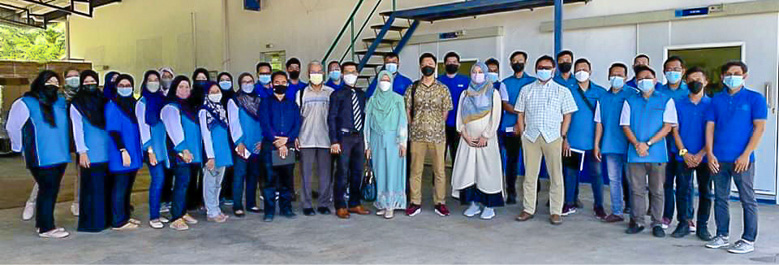 Jardin Pharma Berhad, a Malaysian pharmaceutical company, is ready to set its halal footprints globally.
Jardin Pharma Berhad, a Malaysian pharmaceutical company, is ready to set its halal footprints globally.
The company, established in the middle of the global pandemic in 2021, wants to tap the immense opportunities for halal pharmaceuticals in the global market.
The pandemic has prompted significant investments in the healthcare and pharmaceutical sectors, including the segment of halal pharmaceuticals. With substantial investments in place and consumers’ increasing health awareness, the halal pharmaceutical sector and broader ecosystem are poised for substantial growth.
According to the State of the Global Islamic Economy 2022 Report, Muslim spending on pharmaceuticals increased by 6.5 per cent in 2021, from US$93.5 billion to US$100 billion, and is forecasted to reach US$129 billion by 2025.
Prof Dr Azizi Ayob, co-founder and business advisor of Jardin Pharma, said setting up the company during the pandemic did come with challenges. However, despite the movement restrictions during that time, the team could see the demand for the healthcare segment.
“Of course, there were challenges, but we foresaw them and managed well. At the same time, we felt the need to pick up the opportunity, particularly in the healthcare and pharmaceutical segments,” Dr Azizi said.
With the healthcare and pharmaceutical segments as the company’s main focus, Jardin Pharma extended its business activities through various subsidiaries. These subsidiaries under Jardin Pharma focus on different components such as research and development (R&D), manufacturing, marketing, distribution and trading, and product development.
“Soon, we’re also going to have Jardin Healthcare Sdn Bhd. Under it, we will have various clinical and medical services at our Mary Eve Clinics and the upcoming Jardin Hospital Saujana Utama Sdn Bhd.”
Focusing on nonprescription drugs
On the halal pharmaceutical market in Malaysia, Dr Azizi said some pharmaceutical product categories could be halal certified by the Department of Islamic Development Malaysia (JAKIM), including over-the-counter (OTC) or non-prescription medicines.

“Drugs or medicines that require prescriptions are not allowed by the National Pharmaceutical Regulatory Agency (NPRA) to use the halal status,” he added.
As one of its strategies, Dr Azizi said Jardin Pharma would emphasise non-generic and non-prescription medicines, particularly under the food segment, food supplements and functional food.
“These are the three segments that we could focus more on. It is a bit easier for us to obtain halal certificates for them. These segments do not require a practitioner or doctor to approve. You can get the halal certification if you comply with JAKIM’s halal requirements.
“We have gummy as one of our products. The product is considered as food rather than a supplement, even though it is a vitamin. We believe this is one of the segments we can expand further to capture some of the halal markets in Malaysia.”
According to him, adding halal on top of the current good manufacturing practice (GMP) standards in the pharmaceutical industry will help manufacturers to go beyond just the quality, safety and efficacy aspects of the pharmaceutical products as the halal part emphasises hygiene.
“In other words, when we focus on halal pharmaceuticals, we add one additional quality beyond the current GMP standard, which is hygiene,” He added that Malaysia has robust procedures and standards for halal pharmaceuticals.
Boosting brand visibility
When Jardin Pharma was established, Dr Azizi said the team decided to focus on pharmaceutical products. However, after reviewing some product developments, the drugs under the segment required more than a year to apply for NPRA registration.
“So, within those 12 months, if we wait for one or two years for the completion, we would lose a significant market share. In that aspect, the team decided that we should come up with various products that could be developed within three to six months.
“Of course, the share is not that significant. But, since many people still do not know about Jardin Pharma’s existence, we need to penetrate the market by showing our capability to produce products.
“That’s why we agreed after six months of the company’s establishment to come up with the vitamin gummy,” shared Dr Azizi, highlighting that the company had to put something in the market to establish its brand.
Challenges in the halal pharmaceutical industry
He emphasised that making Jardin Pharma visible in the industry was the company’s first business strategy. At the same time, he shared, the company was still interested in other products and segments.
Touching on the challenges, Dr Azizi said the industry must have more trained personnel who understand the halal manual.
“When it comes to the halal manual, it must be in line with the product development requirements. So, you need to understand the requirements for you to comply.
For example, from the research and development (R&D) perspective, if you don’t have the materials that can comply with halal, the product will not be considered halal at the end of the day.
“The certifying body like JAKIM and others also need to understand that when we talk about halal, we can apply it to what extent. So, it comes from the industry and the regulators.”
Another challenge in the halal pharmaceutical industry, he said, was acquiring the raw materials required to produce advanced pharmaceutical products. — The Health
Stock market listing plans
Jardin Pharma Berhad plans to list its shares on Bursa Malaysia in 2026.
Its co-founder and business advisor Prof Dr Azizi Ayob said the company was actively expanding with various potential subsidiaries.
“That’s why we have to devise a strategy and expand the business in different ways. Later, we will merge and eventually focus on the pre-initial public offering (IPO) stages until we are ready to be listed, probably in three to four years.”
Penetrating the global market
Dr Azizi pointed out that a brand’s visibility could come from different angles. He also shared that Jardin Pharma was invited to visit some potential international partners in the last few months.
“We look forward to partners and collaborators that can help make our brand well-presented and market our products. For us to penetrate different countries, we must have high-quality products.
“Based on my experience as a technical advisor for PT Dexa Medica in Indonesia, I was asked by the company to look into different practices in the Southeast Asian region, including Manila, Thailand, Laos, Cambodia, etc. From that, I found certain areas we could penetrate further.
However, some local country requirements can limit the penetration of a company to certain countries.”
Strengthening its marketing and trading platform
He revealed that in the past few months, Jardin Pharma’s marketing team had done various things to understand the market in different sectors. The company is also open to collaboration and partnership opportunities that align with the company’s focus, said Dr Azizi.
Strengthening Jardin pharma’s subsidiaries
When asked how Jardin Pharma differentiates itself from competitors, Dr Azizi said: “We focus more on various developments across the group.”
He explained that the company focused on strengthening its marketing and trading platform. The team established online and offline marketing to ensure Jardin Pharma can capture online and offline markets.
“This is not the typical practice for the pharmaceutical industry in Malaysia because most of the pharmaceutical companies in this country rely on government tenders. If the companies are members of the Malaysian Organisation of Pharmaceutical Industries (MOPI), they’re the producers and manufacturers mainly for government tenders.
“Of course, this is required. At the same time, they also produce pharmaceutical products for overseas markets.

“So, in this aspect, we have both. We will mainly use our subsidiary, XORIX Sdn Bhd, to produce generic products. At the same time, we will not only focus on that segment.
“We are going to use our existing company for cosmetic products, food supplements, functional food, etc. We understand these segments are open even though the markets are highly competitive,” he said.








